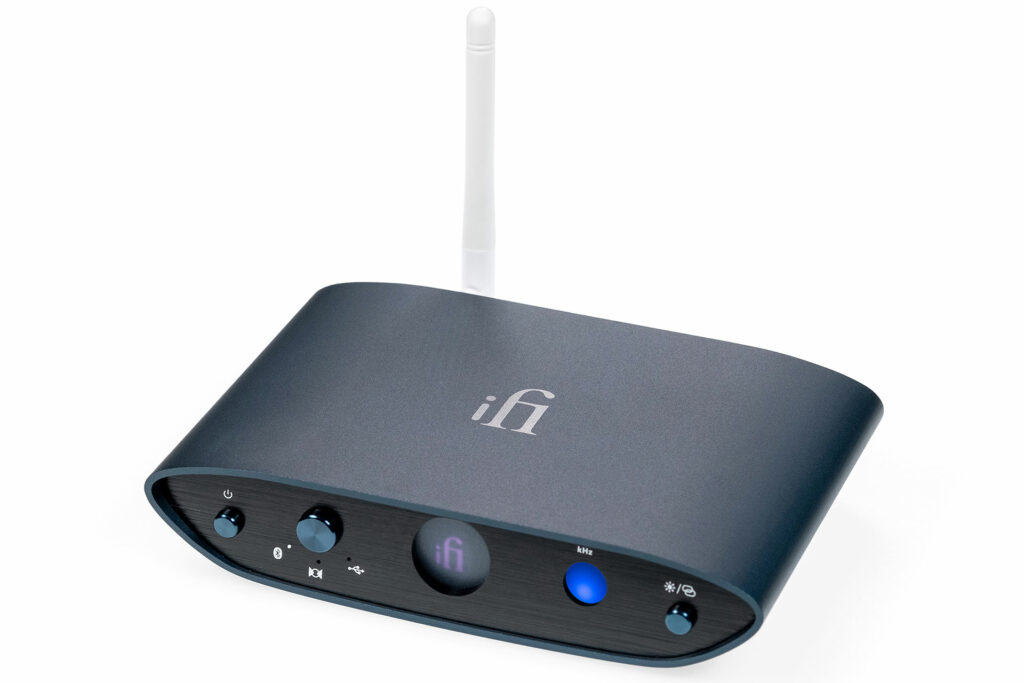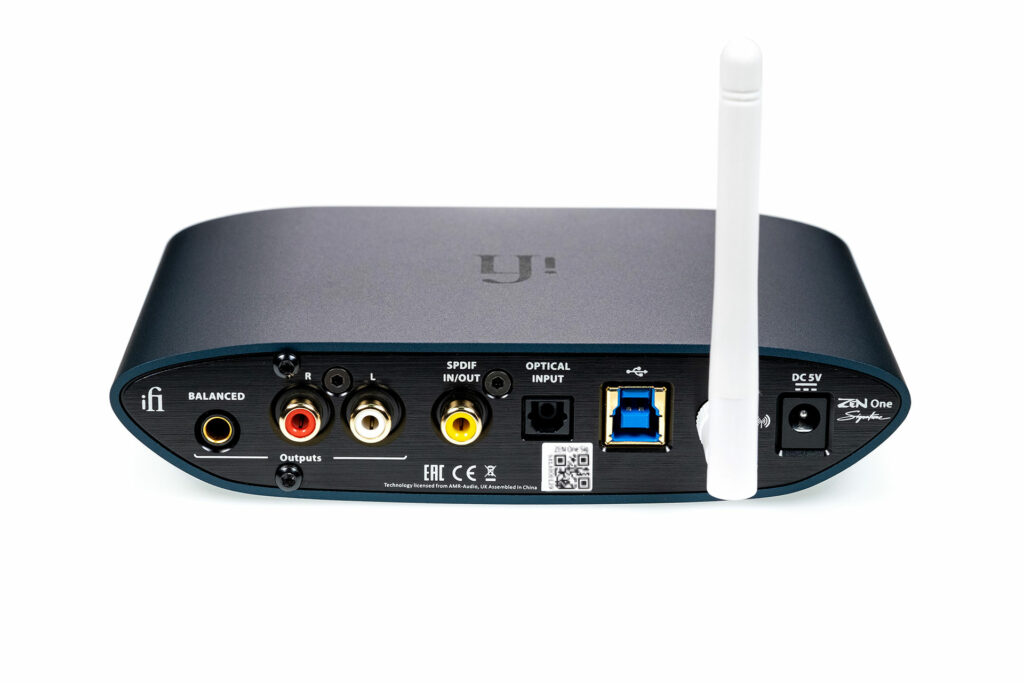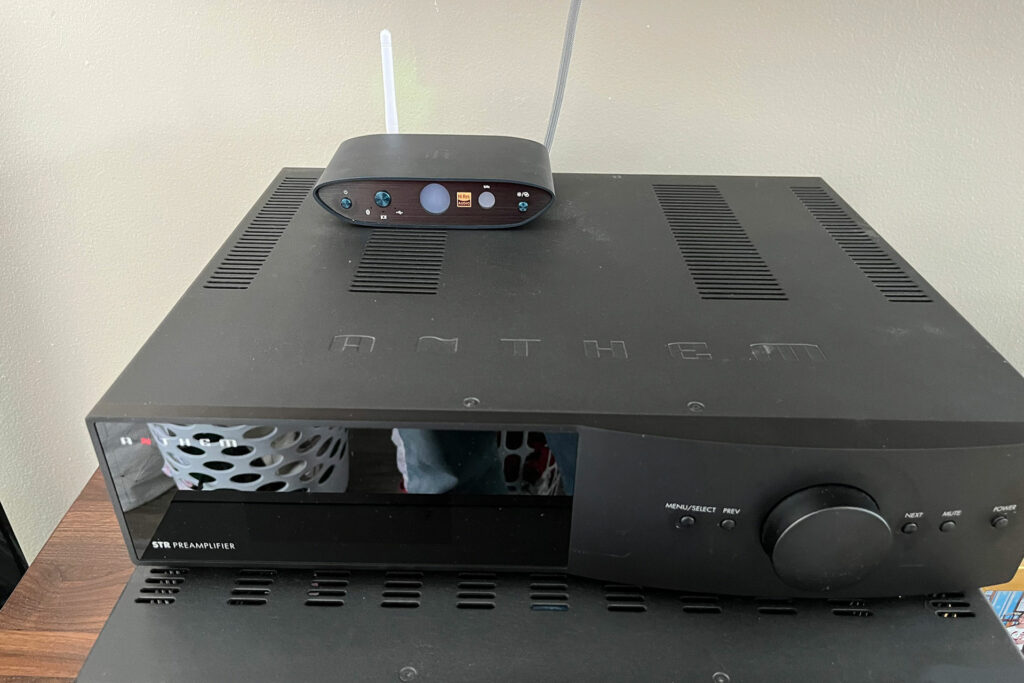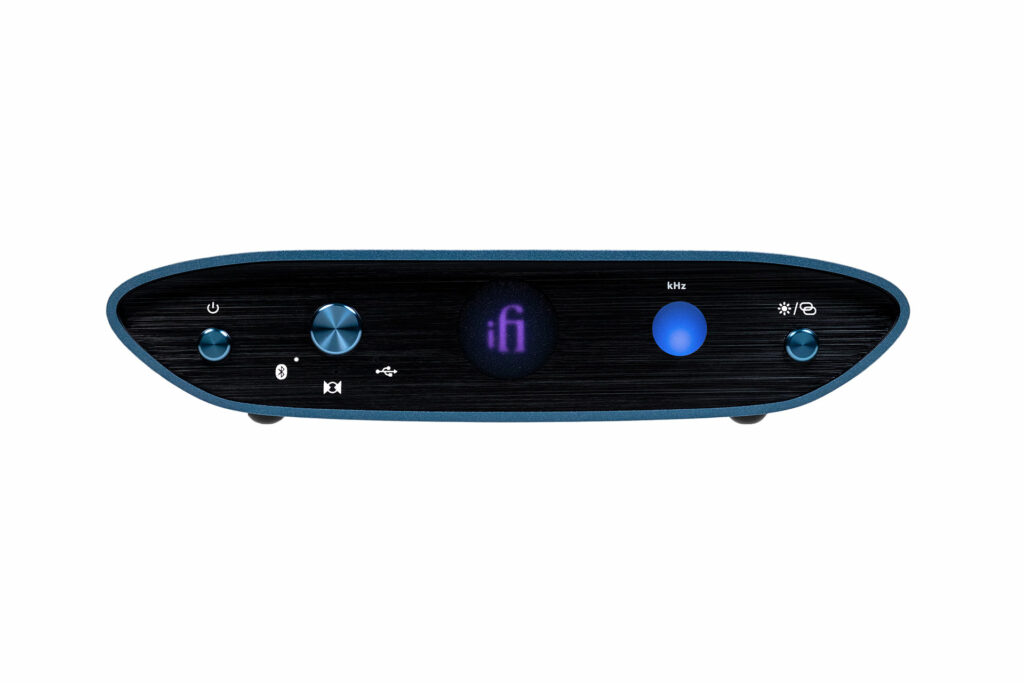In some ways, there are few things that will be as important to the modern audiophile as their DAC, as the vast majority of music today is being listened to through digital sources. Streaming continues to get more and more popular and, with Compact Discs gaining a modicum of retro appeal recently, you will want to find a new-school audiophile DAC that is right for your system. The iFi Zen One Signature is a DAC that you can use with almost any device, as it has both an Optical USB and Digital Coax inputs. The iFi Zen One Signature DAC also supports all of the major codecs (aptX, aptX HD, aptX Adaptive, aptX LL, LDAC, LHDC/HWA, AAC, and SBC) with its Bluetooth 5.1 streaming option. In addition to that, it has support for PCM and DSD up to 32-bit, DSD up to DS256, and MQA up to 384kHz. iFi uses the Burr-Brown True Native DAC converter chip to accomplish the conversion, along with fully-balanced circuitry and Texas instruments low-noise microcontrollers to achieve its sound. iFi uses a series of color-coded indicators on the front of the DAC to indicate to the listener the format and the mode that they are hearing. This system uses both the iFi logo and another colored indicator light to inform the listener.
The iFi Zen One Signature (buy at Crutchfield) represents the most feature-laden, standalone desktop DAC that iFi has in its product line today. iFi is growing a name for itself by building quality DACs in many different form factors. at prices any person can afford. Let’s take a closer look at this one to see how it performs and how it stacks up against the competition.

What Makes the iFi Zen One Signature DAC So Special?
- The size of this DAC is astounding. Weighing in at just 1.1 pounds, and measuring at 6 1/4 inches wide, 1 3/8 inches high and 4 3/16ths inches deep, the Zen One Signature DAC is ultra-lightweight, and small enough to fit into nearly any space.
- There are lots of input options on the iFi Zen One Signature DAC. At this price point, you don’t always get both Coax and Optical, but iFi gives you both of those, plus USB-B input and Bluetooth to ensure that you can use nearly any digital source with this DAC.
- The iFi Zen One Signature’s use of Bluetooth codecs allow you to not only utilize the DAC, but also to use it as a streamer. Yes, Bluetooth has its own sound, but this device is offering you the best that Bluetooth has to offer.
Why Should You Care About the iFi Zen One Signature DAC?
If you’re an audiophile who is looking to add a standalone DAC into your system without breaking the bank, I think this is a device you are going to want to investigate. iFi has been building a solid reputation in the audiophile community for making solid DACs at a reasonable price, and the Zen One Signature is exactly that. This DAC can be a nice upgrade to the DAC on a modest CD player, or streamers, and it is small enough that, if you want to use it at your desk, you easily can.

Some Things You Might Not Like About the iFi Zen One Signature DAC
- It would have been great if the device had an auto shut-off when it isn’t in use. On more than one occasion, I had forgotten that the DAC was still on, when I had turned all of the rest of my audio components off. Even if you couldn’t have the device turn off after, say, 30 minutes of sitting idle, even just adding a trigger to it so that it turned on and off with my preamp would go a long way to ensure that you don’t burn valuable hours of life on the component.
- The device doesn’t have a remote control. This also goes back to the lack of trigger functions, but it would be great if the device had a remote control, so that you didn’t have to get up to turn it on or off, and also to switch the inputs when you are changing the input.
- I wish it came with a more usable USB-B Cable. While part of me is grateful that iFi included an RCA cable and a USB-B cable, I wish the USB-B had a USB-C end, not USB-A. I appreciate that this is nitpicking to some extent, but there isn’t a single device in my home that uses USB-A, so I really couldn’t use the cable at all, and I would guess many consumers would find the same issue, as the USB-A exists on very few tables and computers, and zero phones. I think most users would find themselves purchasing something like this, and immediately going out to find another cable so they can plug their tablet, phone or laptop into the DAC directly.
- The color-coded light pattern to understand the mode and format can be confusing.Given the size of the form factor of the DAC, iFi was going to need to be creative to inform the user, but many listeners will not love having to keep a legend around to understand what the DAC is doing.
- There are no user-adjustable filters. I personally don’t want them, as I don’t want color to my sound from my DACs whatsoever, but there are some who do, which is how this point made it to this section. It just as easily could have been listed as a positive, but it needed to be listed somewhere, right?
Listening to the iFi Zen One Signature DAC…
I ran this DAC through a few different system configurations. The first configuration I used it with was with the Chord Anni (review pending), the Music Hall CD25.3 CD player and my HIFIMAN HE-R9 closed-back headphones. The second system I added it into was my main system, which is the Anthem STR Preamp, the Anthem MCA 225 Gen 2 amplifier, a Sonos Port streamer, and the MartinLogan Motion XT F100 floorstanding loudspeakers. Now, these are two wildly different setups, both financially and functionally, with the loudspeaker configuration costing nearly 10 times more than the headphone setup, but I believe that this really offers some strong commentary on how the iFi Zen One Signature might fit appropriately into someone’s life.
Starting out with the headphone setup, I began with a Nine Inch Nails track titled “The Big Come Down” from their double album The Fragile. Like so much of Trent Reznor’s music from this period, it is incredibly dense. In my listening, the iFi Zen One Signature allowed this track to really rock. It felt like you could hear all the small details that were happening in the background, while the melodies were also clear and in front of you, especially the guitar sound that lingers throughout with its tinny awkward sound, like an out-of-tune acoustic guitar. This isn’t going to be a track that every listener will love, but when you’re trying to understand the sonics of a DAC, its density goes a long way.
Moving on to a true audiophile classic, I cued up U2’s “One” (streaming 44.1kHz) from their Achtung Baby album. I played this through this setup. This was in my initial sessions testing with the bigger system, and I was able to notice more flaws in the DAC in this system configuration. I noticed that the DAC was less revealing than the one that is built into the $4,000 Anthem preamp. This shouldn’t come as a big surprise, given the preamp comes at more than 10 times the cost of the DAC, but what it doesn’t do is show some of the limitations and differences. For the most part, the iFi Zen One Signature handled this track well, but the effects coming from the Edge’s guitar felt like they were slightly veiled in comparison to the Anthem.
The last track I used to test the iFi Zen One Signature DAC was “YYZ” from Rush’s 1981 classic album Moving Pictures. This is always a fun track, and one for me that really highlights what Rush was at their most creative, thus writing an instrumental song with a whip included. Most see the title of the track and, if you’ve ever had to fly to Toronto, you will recognize it as the airport code (Canadian Airport codes are nearly impossible to know off the top of your head, as they are nothing like the city names used by the rest of the world’s airports). However, when you dig a little deeper on this track, the band came to the title “YYZ” not because they were looking to make a song about Toronto, but because the rhythm of the track is that of YYZ in morse code. The sound that you get throughout this track didn’t sound as if had been colored by the DAC at all, and that is a good thing. All of the instruments felt very natural-sounding. Listening to this track on repeat for this review was as enjoyable as ever, and that is saying something, coming from a person who hates listening to tracks on repeat.
Will the iFi Zen One Signature DAC Hold Its Value?
Products in this price range don’t typically hold a lot of value, mostly because you didn’t pay a lot for it. The great thing about this DAC, though, is that you can add it into almost any signal chain and find some value, especially with the Bluetooth support it offers and, ultimately, if you don’t want or need it anymore, you can give it away and know you got your money’s worth from it.

What is the Competition for the iFi Zen One Signature DAC?
The Pro-Ject Pre Box S2 Digital ($399 – buy at Crutchfield) is a little more money than the iFi, but Pro-Ject is giving you some goodies for that extra money in selectable digital filters and a headphone amplifier. This DAC uses the ESS Sabre ESS9038 chipset, and they recently updated the electronics in this product with the 23 edition. One thing to note is that this product doesn’t have Bluetooth input, so if that is something you’re looking for, you will need to look at a different product.
When you’re looking at this price range, you should always be looking at Schiit. The Modi Multibit ($299) has Coax, Optical and USB-C support (yes!), and it has a very competitive price to the Zen One Signature. I reviewed the Modi a couple of years back, and I thought the DAC was a fantastic product, so I wouldn’t expect anything less from the upgraded version of that same DAC.
There has been a lot of fanfare for Chi-Fi DAC in the last few years, because of their overall value at their price. The FiiO K9 AKM ($498 – read the review) fits that mold perfectly. Like the Pro-Ject I also noted, it features a built-in headphone amplifier, and it also uses AKM’s new flagship DAC combo, the AK4191EQ+AK4499EX. This product also features Bluetooth support, as well as USB-B and USB-C inputs, Coax, and optical inputs. While I haven’t had this product in hand, it has all of the makings of being a quality product at its price.

Final Thoughts on the iFi Zen One Signature DAC…
iFi has created a solid DAC in the Zen One Signature, and one that I believe in the right setup can be enjoyed and have a large potential audience. It was an upgrade to the DAC that was in the Music Hall CD player and my Sonos Port steamers as well, which goes to show how useful this product can be, and that comes without even talking about its Bluetooth capabilities. However, this product won’t be loved by everyone, and I don’t believe that was iFi’s plan for this product, either. At the end of the day, it is still a $350 DAC, and it won’t compete with products that are 10 times its price. That simply isn’t feasible, and it shouldn’t be the expectation of audiophiles, either. This is a product that I will consider holding onto, even if it doesn’t fit into my primary system. It does a lot of things well, and I think it’s something I can always find a use for, not only within my review work, but also in my everyday life, where it’s as an upgrade to a CD player, or something I have set up out in my garage to use as a method of playing music via Bluetooth from my tablet.



